Post-Poetry, Part 2: Outpost/Outland
BY Noel Black

Dear Divya,
So there you are in Singapore, and here I am in Colorado Springs, both of which are sort of conflicted homeworlds for both of us, and outlands to the centers of poetic industry (haw haw). When Marina and I moved back here from San Francisco in 2001, we were dot-com refugees. We'd gotten evicted from our apartment, and we had a baby and no careers. I'd been working at Good Vibrations in The Mission for a couple years, hanging out with the poets who'd sort of quantized around New College. But there was already a sense that San Francisco was lost, or dead, even then. I knew some artists who'd gone to the East Bay. Many friends had already left for New York where things still seemed possible in some vague way. That's where we were headed, eventually. But we had this baby and very little money, and Colorado Springs is where I grew up, so we just landed here because my mom and her partner were here and lots of old friends. On one hand, it was an intellectual desert. I arrived in a van with all our crap on 9/10/2001, and then the world changed the very next day. And keep in mind that in 2001, George Bush had just become president and Colorado Springs was home to both Focus on the Family and New Life Church. Its pastor, Ted Haggard, was part of Bush's inner circle of spiritual advisors. Then there was the military: Fort Carson, Cheyenne Mountain Air Force Base (which people are fond of calling NORAD, even though it's not actually there), Peterson Air Force Base, Schriever, and of course the Air Force Academy. So here we were in the middle of this new center of ultra-conservative, international political power, and we're watching beige tanks and humvees passing through on the train everyday, and everyone's got those Christian fish symbols on the back of their SUVs. So for some reasons, in my mind, I decided this was right where I needed to be. It was a sort of discovered missionary feeling that came over me, entirely Quixotic. But I'd grown up in this place in a queer family here, and it felt like so much of the march to war was being wagged by endless homophobic misdirections, and I thought, Byronically: Fuck it; there's a real fight here. Fuck the L=A=N=G=U=A=G=E wars and the poetry politics in the Bay Area at that time, etc. It seemed there was something here worth fighting about. I know it may sound sort of Hobbits in Mordor, but it was. I got a job as an arts journalist and then ended up starting a ad-driven satirical monthly rag in which we got to confront a lot of this culture directly. We had a feature called the Church Kicker and the Church Whipper; we had a feature called Soul Search in which various people would debate one of the head pastors of New Life Church. All that time I barely wrote a poem, but it felt like it was more important to be a poet. And then in 2007, Ted Haggard got busted doing meth and having sex with the male escort Mike Jones and it was like, Of course! I do not have a point here, but that this is another way to be a poet in the unlikeliest places—these outposts as you called them when you were here to read last summer. For me it's definitely something outside of career. Then there's the internet. Hi!
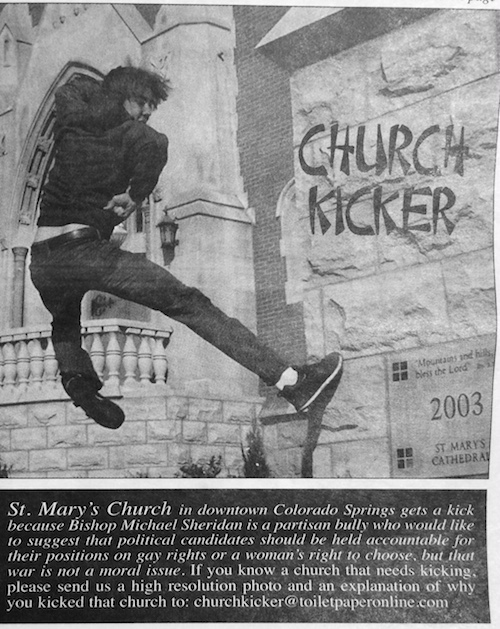
Dear Noel,
So there you are in Colorado Springs, and here I am in Singapore, Singapore. Yes, Singapore is a conflicted homeland for me—I definitely (thought I) dropped the mic when I left this place after the angry years (ages 11 to 18, universally bereft of both cash flow and muscle tone) and when I discovered Sartre, Arundhati Roy, and World Systems theory—all invariably fueling an adolescent penchant for dramatic exits. But before I left Singapore at 18, I had left India at 11, and then I left the US at 31. Leaving is believing—a kind of living. I’ve gotten very good at packing and sleeping in airports. One can make a pillow out of a book and curl the body into a comma almost anywhere.
In the midriff of my travels—Baltimore had the MICA kids and printmakers who listened to poets in dark band-bars (where I discovered Whiteness, Ted Berrigan [dear Noel hello] and the New York School, co-edited with Furniture press’ Chris Casamassima. Philly had Temple, Dirty Franks, yard-glasses for Yeungling (where I discovered the devastations of Bush’s second term and the visionary work of Susan Howe and Caroline Bergvall, and ran a reading series out of the Red Rooster Inn). Seattle had a bookstore that kept overstocking The Secret (where I discovered the inverse relation between capital and conscience and not much else). Buffalo had Troll Thread, Rust Belt Books, Myung Mi Kim’s baffling genius (where I discovered everything else I know, edited briefly with some of the best poets I’ve met, ran readings out of Rust Belt’s dark blood back room, and where I wrote books there to keep bones from freezing into a dissertation that should have been titled “Bad Things Happening to Average People”). And four American cities later, I find myself back in the unlikeliest of places: Singapore—an outpost from American poetics, and yet, I’ve never felt more like an American poet.
At a Valentine’s day reading here, I read from Stein’s notes to Toklas encouraging her to have a satisfying bowel movement (“cow goes splash”) to an audience of Singaporean writers, editors, poets. And then I read to them O’Hara’s “Having a Coke With You” and as I lisped my way through the “Travessera de Gracia in Barcelona,” I felt the most American I have ever felt, thinking of Stein at her desk at Rue de Fleur in Paris or O’Hara taking notes on Barcelona’s medieval streets—displaced and making.
The American cities I’d lived in didn’t always feel like Outposts—it is a military term, after all—a place where one is left with a lone rifle and a flask, far away from the main trenches. The outpost is supposed to guard from a distance, right? But these cities all seem to be at the center of poetry activity and community, yes? Yet, I think an outpost signals a distance between where you were "supposed to be" and where you end up. No matter where that is. I was supposed to be a lot closer to where I was born—coastal and coddled by three seas: the Arabian, the Lakshwadeep, the Bengal. And yet, thirty-one years later, I find myself at a great distance from that and my many other posts, back in Singapore. Bodies do boomerang. The America I left had supped me on Sallie Mae’s barbed tit and then made it nearly impossible to make a living wage, so I returned to this "conflicted homeland." The distances grow. The conflicts don’t resolve. The rifle grows more familiar, the flask is filled with ink, you get really good at shouting across long distances.
Outposts are occupied by people who make community for a while and then leave. Then you find their traces later—small piles of chicken bones and edited manuscripts, cartridges. Outposts are occupied belatedly—you don’t know you’re in one until you realize everything you’ve done to pretend you’re not far away from a center. You count the interviews, the reviews, the frantic accounting in articles and chapters of your connection to an imagined place or moment; everything you’ve done just to claim a patch of land knowing full well people like you aren’t supposed to unpack or own a piece of the land. Because you never really know when an ocean is going to get between you and your body—I keep leaving mine behind and it keeps catching up with me, later—arriving like some thief in a FedEx box. Better waterproof everything. Wet is bad for paper.
Hi Divya,
I don’t necessarily agree that outposts are occupied only by people who make community for a while and then leave, though that fairly-well characterizes the military population. For me it was to unearth the cultures that did, and do, exist here, but which get repeatedly forgotten and re-forgotten over and over as the nomads come and go. So part of me sees it as a resistance to the transitory, even if it is futile.
But there’s also this other city of the internet where we all live now. It makes physical place more and less relevant at the same time. You and I have both undertaken projects in .pdf publishing—Troll Thread and The New Heave-Ho respectively—which allow for a placelessness, for participation in a conversation that used to be much more heavily bound to place. It’s interesting to me that much of the conversation about .pdf publishing has been about the internet’s ability to “publish the unpublishable," rather than about access. But poems taken out of the context of place can also exacerbate dislocation. Poetry (at least in the cirlces in which we overlap, I think) is still highly social in its requirements. It oscillates between career and avocation in this quantum way that mirrors the outpost/outland fantasy I have. And as I think about that fantasy as I’m writing these words I realize it’s about the ability to connect the specifics of place and its social structures to the placelessness in which you and I can be having this conversation.

My wife, Marina, began the process of opening this small-press poetry and art bookstore here in Colorado Springs at around the same time I started The New Heave-Ho. The bookstore couldn’t be more physically bound to this place, which also couldn’t, so we thought, be more hostile to small-press poetry and art culture. But we found almost from the first day that our openings and events were packed with people, many of whom we didn’t know who were there to read and be with all these physical books from all over the country and world. So there’s this quantum exchange between these cities of place and the city outside of time that should allow us to rethink the myths of New York and San Francisco, Oakland and LA, Chicago, wherever, and open up the possibilities of being a poet outside the presumed centers of poetry AND academia, which seems to have become a first resort for a lot of writers. Nothing against it, of course!
Dear Noel,
I have plenty against Academia, even as I am its product and prodigal posterchild. I am featured on all my alma mater’s websites as a "success story" of what an MA in Creative Writing and PhD in English will buy you: 1. Pants, and, 2. A slightly less violent interest rate for the life-long drag of knotting up Sallie Mae’s rattling snakes (or, newly Navient, like some biometrics company in a Blomkamp film). And it is perhaps with this privilege that I can divulge that out of the last 10 days I have tried to make poetry, 9 have been taken hostage by academic bureaucracy—I fill out more forms per day than I do the bones of my manuscript. I wrote Rob just this morning saying that it is very wrong indeed to tie the tenure process to the making of poetry—it changes the way your ideas grow; you will pick them unripe and put them in rice sacks hoping they’ll ripen coddled by grain instead of rotting, on the way to market, to be sold far from you. I am OK with being ungrateful for forms of labor that ask me to account numerically for the impact of my words. I am preceded by so many poets in the academy who have counted their citations with just their middle fingers.
Perhaps I think of the Outpost not only in geographic terms—an outpost is a situation where one finds oneself out of place. And even as I’ve remained within Academia for my entire life, I’ve rarely found myself belonging in seminar rooms or offices. Buffalo, which would be a “presumed center of poetry” as you call it, has a room called the Oscar Silverman room—and on the walls of this room hang these watery sketches of seminars in the Buffalo of Yore featuring only white men conspiring, gesturing, inhabiting. But their inhabiting also produced inhibitions for many of us—us/those who would never be sketched in our gestures for those walls. This “center” is also ribbed in—Rachel Blau DuPlessis, in her book Purple Passages, recalls speaking to Nancy Armstrong about Charles Olson asking her to sit outside the seminar room at UB. She only lasted one day in his course. There are no longer chairs placed outside the seminar rooms, of course, but that ribbed in space? I have those bones to pick. In this “presumed center of poetry,” the velveteen walk into the Special Collections is flanked by so many bejeweled and fair-armed figures, one is cued into a kind of string-quartet variety of assimilationist pride in just having made it into these halls—into this center.
The whole thing befits an academic training-montage style crawl up the hairyleg into someone else’s discourse. My first day there, a fellow PhD candidate shook my hand and said “Let me guess, postcolonial lit?” I began tamping the earth that day so I could pitch my tent the next. Part of building the outpost is just survival—the thing you’re defending is a barely articulated sense of purpose or growing aesthetic before it can be made to be center or be reabsorbed into the narrative of a place and its legend. Being an outpost poet just means, to me, not wanting to participate in this project of reabsorption. It means building a room of your own wherever the fuck you go. Including when you find yourself in a “presumed center of poetry”—it only becomes your center if you are at its center and not its margins.
Troll Thread made that possible in important ways for poetry (and my personal sense of its necessity) and is continuing to do so. When I was still w/ them, the press taught me the possibility of provisional editorial poses held long enough to solve an aesthetic problem or raise one; the possibility of supporting and hosting uncategorizable texts because it didn’t cost cash-money (but did cost other kinds of currency); the possibility of urgency being its own reward and method: a kind of quick draw editorial purpose. The PDF made that possible, as you note—and it let TT make, keep, and nourish friends in many elsewheres, just as it brought those elsewheres to Buffalo, changing its texture within a “center,” changing which parts of its aesthetic legacy were visible. I can’t speak for what they are up to these days, (and I don’t know if they’ll agree w/ being thought of as Outpost in any way) but I suspect it is important stuff that will keep making any geographic site for their editorial purpose secondary to a much more important location—a shared need to curate placeless poetries, perhaps: texts that don’t belong on shelves; that can’t be printed; that will break your or printer or back or bank.
Dear Divya,
I agree with my definition of outpost poetry [slightly] more than yours (lol), but only because my outpost seems a lot less provisional, which means maybe it isn't outpost. Maybe my idea of outpost has more to do with this fantasy that I've situated myself as an insurgent against the colonists when in fact I'm the descendant of colonists and a settler, which is depressing, and true! That's at least part it.
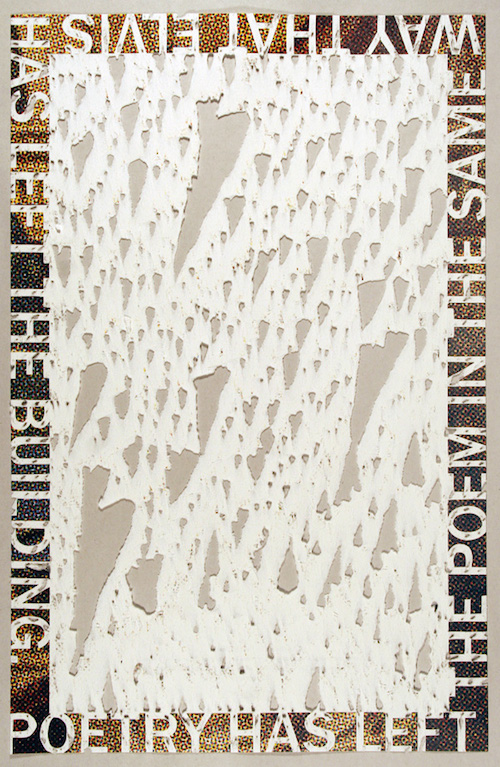
What I've been rolling around with lately is this idea of post-poetry—that maybe, again, being a poet is more important than writing poems and putting out books. At least for right now. I've been having fantasies of quitting poetry again like I did in the mid-aughts, but only because it seems like, as printer-poet Aaron Cohick's broadside of Darren Wershler's "Aphorism" says: POETRY HAS LEFT THE POEM THE SAME WAY ELVIS HAS LEFT THE BUILDING. Or maybe it's as Genesis P-Orridge has said about his transformation into what appears to be the transgender body in of the likeness of Lady J—that it's not about gender or sexuality at all, it's about feeling trapped by A BODY—any body, and wanting to join Lady J post-body off in the liquid goo. Sometimes I feel trapped by books and all their baggage. There's this great Alejandro Zambria quote at the beginning of his interview with Daniel Alarcón in the new BOMB magazine where he's talking about the difference between being forced to learn to read in school and the pleasure of the language/literature of home. He says,"If knowledge was imposed top-down in school, reading, in my case, arrived all of a sudden, without much of a context. I always associated [language] with pleasure. My interest in literature came from lyrics, from language, jokes, and tongue twisters, more than from direct reading — there weren't any books around. There was literature, though." Not that there weren't books around when I was a kid, either. But the language we spoke at home wasn't just private, it was secret, or simply unarticulated, but shared. So there's this part of me that wants to disassociate the languages/literature and remove the experience of language from books, and let them out into the place. Don't get me wrong, I'm not against books, but I find myself more and more drawn to the kinds of experiences of language like the Anti-Surveillance Feminist Poet Hair & Makeup Party that I wrote about HERE where it's an experience that Stephanie's pamphlet created or predicted, but the pamphlet was a means to a shared experience. I know it's all very situationist. But yeah, it feels less planned than that—like a conversation, banter, laughter, then toss. That's what I find so compelling about .pdf publishing, too. It's the less fetishy part of literature and all the status books confer whether there's money in it or not.
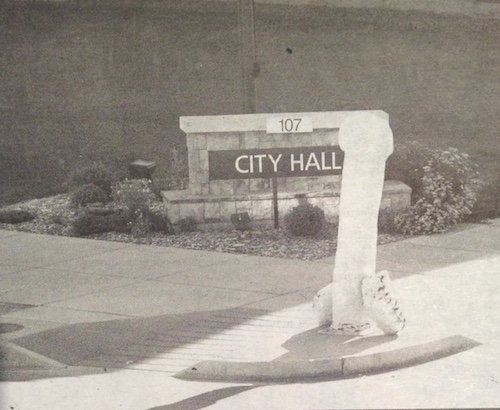
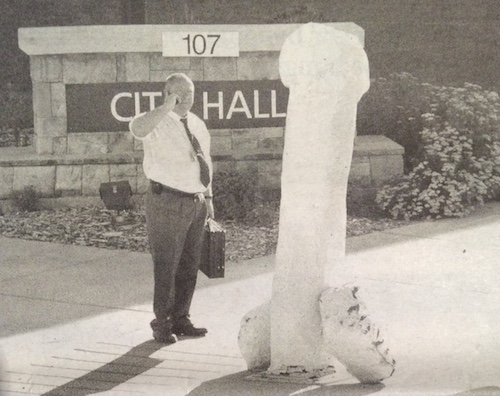
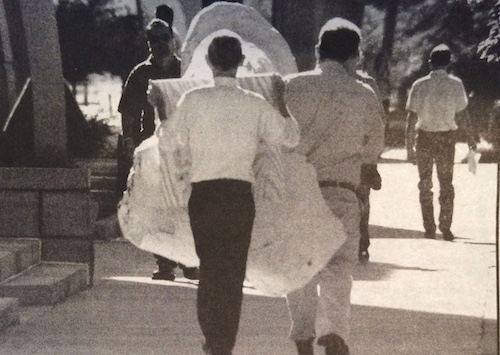
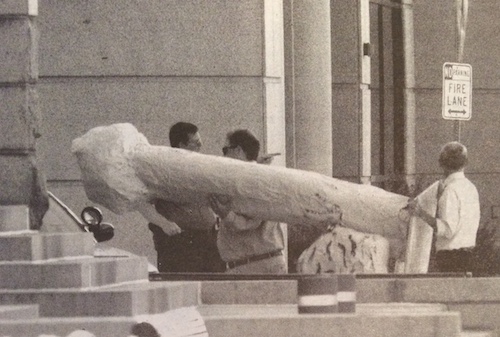
Another thing we did during the days of The Toilet Paper that I think about often was we made this 8-foot tall papiér-maché penis as a prank. The original idea for the prank was to make the thing, put it out in a public place, and then get photographs of the cops hauling it away hoisted on their shoulders or tucked under their arms. So me and this gang of friends got together in a garage and constructed it out of chicken wire and newspaper and poster paint. We attached these hilarious balls that made no sense. Then, the next morning, a few of us loaded it into the back of my truck, took it downtown, and dropped it off right out in front of City Hall. My co-publisher had positioned himself up on the roof of a parking garage across the street with a telephoto, and we all just split after dropping it off. With all the post-9/11 paranoia, we were super nervous, but thought maybe they'd come blow it up with the bomb-bot, which would also have been great. About 20 minutes after we dropped it off, a couple of bureaucrats came out and carried it off through the back door of city hall (so many lulz!). It wasn't as good as if the cops had done it, but we got a photo of one of them on his cell looking up at the tip. Anyhow, it turned out that we had inadvertently done our prank the day after our then-mayor had refused to sign a proclamation welcoming gay pride. So, of course, it was seen as a protest, which it was, just against everything. We published the photos on our blog a few hours later, but denied having any involvement. A few hours after that it wound up on the national Fox News ticker. There was so much pleasure in fuxing with the power culture here—the same kind of thrill of agency I remember having as a young writer after I first discovered Ron Padgett's poems, or heard Eileen Myles read for the first time in the late-90s, or reading Watchmen for the first time. It was like—yeah—I can rewrite this place, my hometown, and the bullshit "Evangelical Vatican" narrative it was selling at the time. And I would propose this outpost/outland poetics to any poets who don't want to go into debt to get an MFA/PhD, who want to leave New York (Hi Judah!), or who don't want to participate in the status economy of poetry: There's this other possibility out there that you can call whatever you want—poeting! Do you what you want, of course. But we live in a time when, for as many doors that have closed, you can still de-gentrify, take up an outpost in the outlands and be a poet. It's not like you'll never see your friends again, all of whom are probably on tour right now. That's why Aaron Cohick and Corie Cole and Marina and I started The Say Hello To Your Last Poem reading series out on the rocks in our back yard where I first met you and Josh and then we sat around in the kitchen all night talking. That to me was it. And if we've learned anything from ConPo, it's that we don't have to write books anymore. LOL.
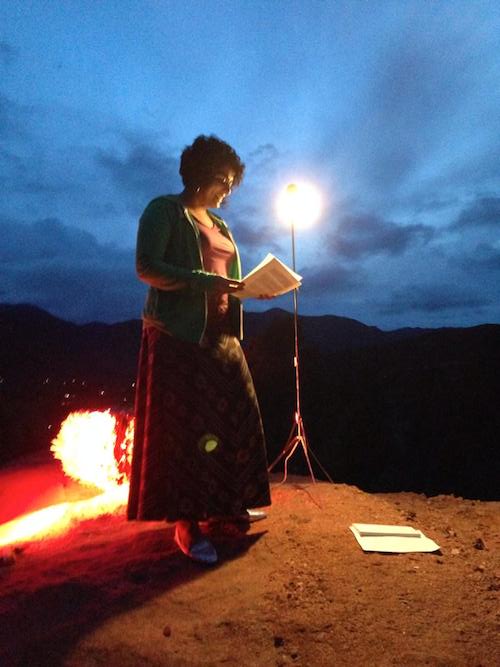
Of course, it's whatever it needs to be. Like for you it may always be the tent. CA Conrad just became a wandering mendicant, which is perfect since his (soma)tics feel like the outposts of every place. wherever Or maybe you end up setting up a base, settling in Singapore... I could send you contraband sticks chewing gum tucked between the pages of books, and you could walk around Singapore chewing one piece every day, thinking poems into the gum all day long and make a giant gumball out of it and send it to me. Then I'll make it back into sticks of gum and each one will be a book called Divya Victor's Singapore Spirit Spit, and I'll send them back to Singapore, and you'll get arrested and be an international cause celébre.
I feel like I'm so full of shit, Divya. Maybe even more than others!
Divya Victor is the author of Natural Subjects (Trembling Pillow, 2015), UNSUB (Insert Blanc, 2015), Things To Do With Your Mouth (Les Figues, 2014), Swift Taxidermies 1919-1922 (GaussPDF, 2014), Goodbye John! On John Baldessari (GaussPDF, 2012), PUNCH (GaussPDF, 2011) and Partial Derivative of the Unnameable (Troll Thread, 2012); and the chapbooks Hellocasts by Vanessa Place (2011) and SUTURES (2009). She lives in the United States and Singapore.
Poet, publisher, translator, and radio producer Noel Black was born in Tucson, Arizona and grew up in...
Read Full Biography

